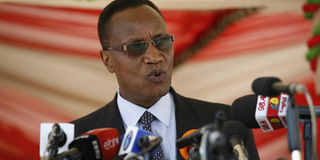Kaimenyi says No to condoms for students

Education Cabinet Secretary Jacob Kaimenyi. PHOTO/FILE
What you need to know:
- Prof Kaimenyi said that the ministry would continue to educate children on the need to abstain from sex.
- The Reproductive Health Care Bill that the Senate debates this week seeks to make it possible for school children to have access to contraceptives.
Historical law
There will be no pills or condoms for students.
Cabinet Secretary for Education Jacob Kaimenyi said that such a programme would erode the morals of Kenyan children.
Introducing contraceptives in schools is not the way to go, he said. “It will encourage immorality. We cannot allow condoms everywhere.”
Prof Kaimenyi said that the ministry would continue to educate children on the need to abstain from sex.
Teachers unions, Kenya Union of Post-Primary Education Teachers (Kuppet) and Kenya national union of teachers (Knut) have also opposed the plan.
Instead they have asked the government to expand the curriculum and include sex education.
The Reproductive Health Care Bill that the Senate debates this week seeks to make it possible for school children to have access to contraceptives.
Historical law
If the Bill that has been sponsored by Senator Judith Sijeny passes, it will be the first time that such a law finds its way into Kenya’s statute books.
Speaking on Nation FM’s “State of the Nation” radio show, Prof Kaimenyi also maintained that the laptop project for primary schools was still on. The ministry, he said, was waiting for a court case to be concluded.
Describing Kenya as a litigant state where people rush to court every time, the minister said the initiative would go on as planned.
Prof Kaimenyi also said there were plans to roll out a hybrid systems that will see computers delivered to schools to benefit classes 2-8 pupils.
The CS further said that the government had agreed to undertake examination registration for pupils from poor families.
“We hope to end this problem that has seen children not register for national examinations in schools due lack of money.”





